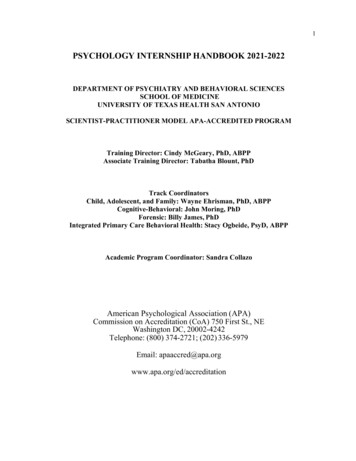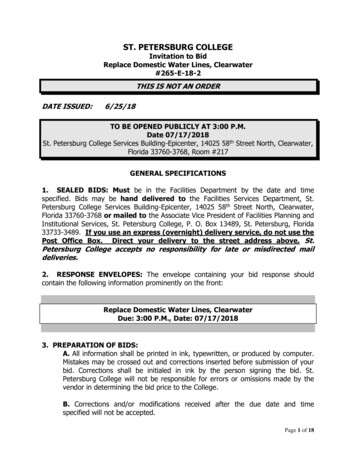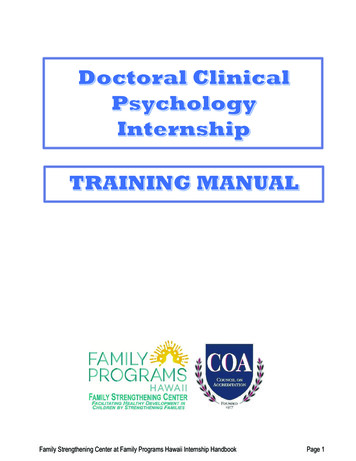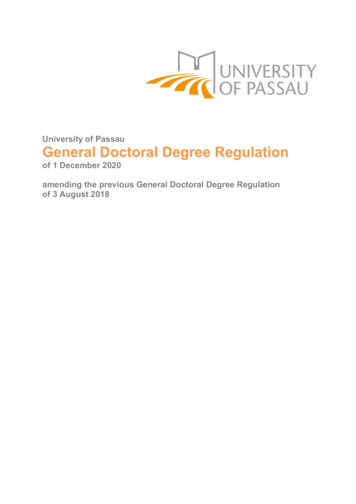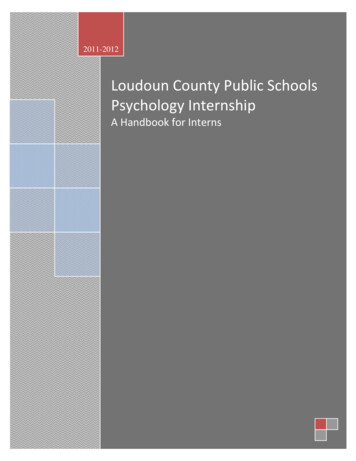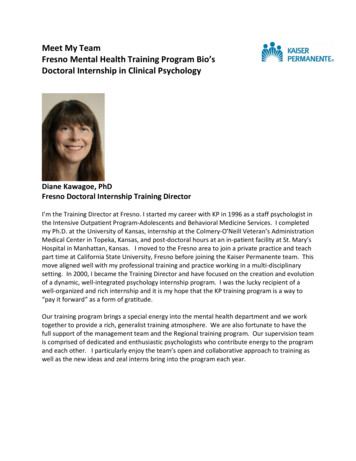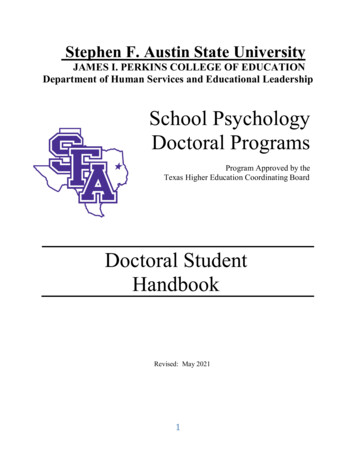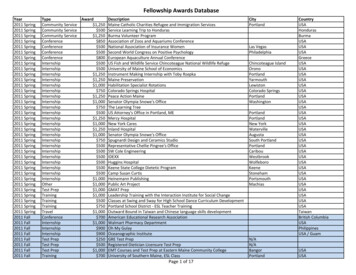
Transcription
FCC Petersburg Psychology Doctoral InternshipFCC PETERSBURG2023-202421692169111
FCC Petersburg Psychology Doctoral InternshipTable of ContentsIntroduction . 3Overview of the Bureau of Prisons . 4Psychology Services in the Bureau of Prisons . 5Psychology Services at FCC Petersburg . 6Psychology Internship at FCC Petersburg . 6Program Aim, Competencies, and Outcomes . 6Internship Duties . 8Internship Rotations . 9Didactic Training . 10Research . 10Mock Testimony . 11Journal Group/Case Law Seminar . 11Temporary Duty Assignment (TDY) Opportunities . 11A Day in the Life of a FCC Petersburg Intern . 12Supervision . 13Intern Evaluation. 13Benefits . 14APA Accreditation and APPIC Membership. 15Frequently Asked Questions . 16FCC Petersburg Psychologists . 18Surrounding Area and Local Points of Interest . 19Career Opportunities at the Bureau of Prisons. 21How to Apply. 22Eligibility Requirements . 22Application Process and Deadlines . 23Additional Information . 25Contact Information . 26Appendix . 27Internship Admissions, Support, and Initial Placement Data . 27References . 322
FCC Petersburg Psychology Doctoral InternshipIntroductionThe Psychology Services Department at Federal Correctional Complex (FCC) Petersburgis delighted you are considering your doctoral internship with us. We hope this brochure willserve to answer some basic questions about our internship program, as well as dispel some of themore common stereotypes about working with a prison population.This brochure will provide you with information about both the Bureau of Prisons (BOP)in general, and FCC Petersburg specifically. The brochure begins with an overview of the BOPas well as the roles of psychology and the Psychology Internship Program.The second part of this brochure provides a detailed discussion of the PsychologyInternship Program at FCC Petersburg. Included is information about the population, internduties, research opportunities, didactic training, supervision, and benefits. We’ve also includedinformation about our Psychology staff and the local area to help you get to know us better.The brochure concludes with a discussion of career opportunities within the BOP as wellas the instructions for applying to our internship program. We encourage you to look at ourDoctoral Intern and Psychologist web pages to learn more about the opportunities that exist atthe BOP.For interns, the selection and location of the doctoral internship are two of the largestfactors in determining subsequent career direction. We encourage you to consider the materialyou read in this brochure carefully. We believe our training program is of the highest quality andwill both challenge and support you as you develop into a confident and knowledgeable mentalhealth professional. We currently have three intern positions available at our site and lookforward to receiving your application.3
FCC Petersburg Psychology Doctoral InternshipOverview of the Bureau of PrisonsOver the last 90 years, the BOP has established 122 institutions and currently housesapproximately 153,000 offenders. With the core values of Respect, Integrity, Courage, andCorrectional Excellence, the BOP has earned the reputation as one of the most elite correctionalagencies in the world.Incarcerated individuals convicted of the most serious offenses and those whoseinstitutional adjustment is poor are housed in high security settings, or penitentiaries. Mostincarcerated individuals live in medium, low, or minimum security institutions which providegreater degrees of personal freedom. All facilities have in-house support services, includingEducation, Medical and Psychology Departments.Although all incarcerated individuals are convicted of federal crimes and separated fromthe community, incarcerated individuals are persons, each with his or her (about seven percentare women) own needs and abilities. Many incarcerated individuals have serious mental healthand behavioral disorders and require assistance to maintain psychological stability necessary tofunction adequately in their environment. Therefore, psychology services play an integral role inmental health treatment of the federal population.The BOP provides ample resources toward reentry programming to assist those who aremotivated to change maladaptive thought and behavior patterns. Through the myriad ofprograms developed to address criminogenic needs, the federal recidivism rate has declined toonly 34%, half the rate of many large State Departments of Corrections. These reentry programsinclude academic and vocational programs, chaplaincy programs, and a wide range ofpsychological services.4
FCC Petersburg Psychology Doctoral InternshipPsychology Services in the Bureau of PrisonsWith a team of over 35,000 employees, including more than 600 Psychologists andanother 600 clinical service providers and psychology administrative support staff, the BOP isone of the largest employers of mental health professionals in the United States. In addition topsychology technicians and mid-level provider “treatment specialists,” Psychology Services inthe BOP employs doctoral-level clinical and counseling psychologists. Psychologists arerequired to be licensed or license-eligible, and are encouraged to seek further credentialing (e.g.,American Board of Professional Psychology (ABPP), American Psychological Association(APA) Division Fellowship). Maintaining professional competencies is a priority and annualcontinuing education is provided to every BOP Psychologist.The primary mission of Psychology Services within the BOP is to provide psychological,psychoeducational, and consulting services to incarcerated individuals and staff. PsychologyServices staff assess the needs of each inmate in custody and ensures all incarcerated individualswith mental health needs have access to the level of psychological care comparable to thatavailable in the community. The focus of treatment varies from crisis-based interventions to themodification of deeply entrenched maladaptive patterns of thinking and behaving. Incarceratedindividuals within the BOP may present with a range of diagnoses, to include psychoticdisorders, personality disorders, mood disorders, substance use disorders, and/or cognitiveimpairment. Psychologists in the BOP engage in a wide variety of clinical activities includingpsychodiagnostic assessment and treatment planning, individual therapy, group therapy, suicideprevention, and self-help and supportive services. In addition, Psychology Services staffcollaborate with a multidisciplinary team and provide consultation to medical, custody, and unitteam staff to provide comprehensive treatment and reentry resources to incarcerated individualsin our care.5
FCC Petersburg Psychology Doctoral InternshipPsychology Services at FCC PetersburgThe FCC Petersburg Psychology Services Department averages approximately 20-22full-time staff members, including staff members of diverse training and personal backgrounds.Psychology staff at FCC Petersburg serve medium, low, and minimum security male andtransgender incarcerated individuals. Psychological services are provided to maximize publicsafety and personal [incarcerated individual] change, via the provision of multiple servicesincluding crisis intervention, suicide risk management, psychiatric referrals, psycho-educationaland psychotherapy groups, individual psychotherapy, brief counseling sessions, intakescreenings, and diverse preventative services. Psychology staff at FCC Petersburg arecommitted to providing high quality, ethical, and culturally informed psychological serviceswhich are guided by empirically supported interventions.FCC Petersburg offers incarcerated individuals multiple programming options. FCCPetersburg is the only Sex Offender Management Program (SOMP) site in the Mid-AtlanticRegion of the BOP, and it is one of only several BOP Psychology Internship sites offering afocused rotation for those who have committed sexual offenses. FCC Petersburg SOMP staffserve to assess, treat, and manage the largest population of incarcerated individuals who havecommitted a sexual offense housed at any BOP medium or low security facility. FCC Petersburgalso serves to provide extensive residential and non-residential substance abuse treatment toincarcerated individuals. Somewhat unique to FCC Petersburg, it staffs residential substanceabuse treatment programs at both its low and medium security facilities and offers nonresidential substance abuse treatment across all three security levels.Psychology Internship at FCC PetersburgProgram Aim, Competencies, and OutcomesThe aim of the Doctoral Psychology Internship Program at FCC Petersburg is to train entry-levelprofessional psychologists who can also function competently in the correctional environment.This is achieved by using the following competencies as benchmarks for our training of interns:Competency 1: Research – The intern will demonstrate proficiency inunderstanding and applying scientific research to the practice of psychologygenerally, and the professional practice of psychology in correctionsspecifically.Competency 2: Ethical and Legal Standards – The intern will demonstrateproficiency practicing psychology within the boundaries of the ethical andlegal principles governing professional behavior. The intern will alsodemonstrate a commitment to professional growth and development generally,and within the correctional environment specifically.6
FCC Petersburg Psychology Doctoral InternshipCompetency 3: Individual and Cultural Diversity – The intern willdemonstrate awareness of and sensitivity to cultural factors impacting clinicalservices with diverse individuals, groups, and communities who representvarious cultural and personal backgrounds and characteristics.Competency 4: Professional Values and Attitudes – The intern willdemonstrate proficiency in providing psychological services that areconsistent with professional values, beliefs, and practices within the fieldgenerally, and within the correctional environment specifically.Competency 5: Communication and Interpersonal Skills – The intern willdemonstrate proficiency in both written and verbal communication with peers,supervisors, and other staff that is timely, accurate, and jargon free.Competency 6: Assessment – The intern will demonstrate proficiency inconducting screening, assessment, and diagnosis for a wide range of disordersand problems, using a multimodal approach, specific to the needs of thesituation for individuals, groups, and/or organizations.Competency 7: Intervention – The intern will demonstrate proficiency inplanning and implementing a variety of evidence-based practices, includingempirically supported treatments, to address mental health needs amongindividuals, groups, and organizations.Competency 8: Supervision – The intern will demonstrate proficiency inunderstanding basic principles of clinical supervision (e.g., buildingsupervisory alliance, providing and accepting effective summative feedback,promoting growth and self-assessment of peer/trainee, seeking consultation)and apply these principles as peer supervisors during group supervision and/orwith doctoral practicum students, if available.Competency 9: Consultation & Interprofessional/Interdisciplinary Skills– The intern will demonstrate proficiency in fostering and coordinatingrelationships with various disciplines in the correctional environment (e.g.,Management, Correctional Services, Unit Management and Health Services)by providing written and verbal communication, and professional assistanceresponses to client or system needs and aims.Through the combination of individual and group supervision, experiential learningelements (e.g., direct provision of mental health services), and educational activities (e.g.,7
FCC Petersburg Psychology Doctoral Internshipdidactic presentations, assigned readings), interns will gain knowledge and skills in the abovelisted domains within a correctional environment. Exposure to a correctional facility and anincarcerated population will contribute to interns being well trained for continued work within aprison setting. Perhaps the best indicator of this effort lies in the fact that, historically, about 50%of our interns are hired as Staff Psychologists within the BOP shortly after graduation. However,training is purposely tailored to be sufficiently broad so that interns are well suited for work in awide variety of clinical settings.The internship program is structured to ensure interns receive training in all aspects of thePsychology Services Department. Interns bring considerable knowledge of psychological theoryand science-based practice gained in academic and practicum settings. During internship, internsare further exposed to the scientific basis of psychological practice via didactic seminars,assigned readings and supervision of clinical work. In addition, the internship program providesabundant exposure to the application of critical/scientific thinking in the understanding andtreatment of individual cases through clinical training experiences and clinical supervision.The training philosophy of the internship program emphasizes experiential learning andconsiders both the tremendous opportunities available within our setting and the inherentchallenges of working in a prison environment. Interns will learn by providing a variety ofpsychological services to incarcerated individuals throughout the training year and bycollaborating with staff in other disciplines. To facilitate professional independence andconfidence, training experiences proceed in a sequential, cumulative, and graded manner. Forexample, at the beginning of the year, interns may initially observe supervisory staff conductrounds, perform intake interviews, and engage in crisis intervention. Interns subsequentlyperform these functions in the presence of supervisory staff and as interns feel more comfortableand display increased competence, they perform these tasks independently.Through the internship training program, interns will develop a satisfying professionalidentity based on self-awareness and confidence in generalist assessment, intervention, andconsultation skills, as well as exposure to specialty areas of professional practice in the field ofcorrections. Interns are challenged to participate actively in individual and group supervision,staff meetings, and didactic seminars.Internship DutiesPsychology Interns are required to complete 2,000 hours of training over a 12-monthperiod, along with identified clinical experiences and adequate ratings on intern evaluations, tosuccessfully complete the internship program. Training experiences include clinical contacts,supervision, didactics, and other professional activities. Interns at FCC Petersburg, like all BOPemployees, are considered essential workers and are expected to report to the institution Mondaythrough Friday (excluding federal holidays), even during the COVID pandemic and otherpotential emergency situations. The internship year begins in August and ends the followingAugust, and normal working hours for interns are considered 7:30 a.m. to 4:00 p.m. Please note8
FCC Petersburg Psychology Doctoral Internshipall interns will receive generalist training working as a psychologist-in-training within acorrectional environment. A basic description of additional training experiences will follow.Internship RotationsFCC Petersburg Psychology Doctoral Interns will have the opportunity to complete afour-month rotation on each of the available primary rotations (e.g., Drug Abuse Program,Correctional Psychology/Mental Health, and Sex Offender Management Program). PsychologyInterns will additionally complete a year-long secondary general population/mental healthfocused rotation, where each Psychology Intern will have the opportunity to provide longer termcare to their caseload.Sex Offender Management Program (SOMP) RotationFCC Petersburg is one of only a finite number of currently activated Sex OffenderManagement Programs (SOMPs) in the BOP. This rotation presents Psychology Interns with theexclusive opportunity to work with those who have offended sexually. Psychology Interns willwork closely with the SOMP Coordinator, SOMP Psychologists and SOMP TreatmentSpecialists to assess, treat, and manage individuals with sexual offense histories at FCCPetersburg. Psychology Interns will be trained to use risk assessment instruments, provideempirically supported treatment, identify risks to the public, and develop discharge summaries.Psychology Interns will participate in both the individual and group treatment of individuals whohave offended against others in a sexual manner. Opportunities may also exist to completepsychological testing, as indicated. Typically, there are approximately 750 individuals withsexual offense histories on the compound of the FCC Petersburg medium security facility.Drug Abuse Treatment Program (DAP) RotationThe Residential Drug Abuse Treatment Program (RDAP) is an evidenced basedresidential treatment program designed to address the challenges of incarcerated individuals withsevere substance use disorders. RDAP makes use of a Modified Therapeutic Community tofacilitate change. Psychology Interns will have the opportunity to be members of the therapeuticcommunity, to participate in Community Meetings, and to provide individual and grouptreatment. Training will include engaging incarcerated individuals in various stages of treatmentthrough the use of motivational interviewing and a cognitive therapy model. Individual andgroup treatment, and diagnostic evaluations, are conducted to support participants’ efforts tosuccessfully re-enter society with a substance free lifestyle.Correctional Psychology/Mental Health RotationProvision of psychological services for the general population remains a coreresponsibility of any correctional psychologist. FCC Petersburg houses nearly 3,000 generalpopulation incarcerated individuals. Typical requests for services from general population9
FCC Petersburg Psychology Doctoral Internshipincarcerated individuals pertain to depression, anxiety, adjustment issues, identity issues, desirefor self-improvement, grief issues, and/or family related distress.Psychology Interns will be actively involved in the provision of varied clinical activitiesassociated with meeting the psychological needs of the general population. Such clinicalactivities include providing individual and group therapy, completing psychological intakeassessments with incarcerated individuals entering the complex, obtaining and reviewingpsychological treatment reports and assessment data, completing psychological assessments(e.g., MMPI-2), developing diagnostic impressions and treatment plans, and writingpsychological evaluations. Psychology Interns will also be actively involved in learning how tocomplete, document, and disseminate suicide risk assessments, and will complete psychologicalassessments in response to referrals from other departments. Psychology Interns additionallywill develop case conceptualizations of incarcerated individuals presenting with symptoms of apsychological disorder, conduct psychological reviews of incarcerated individuals housed in theSpecial Housing Unit (SHU), and make referrals to medical staff for psychotropic medicationevaluations.Didactic TrainingPsychology Interns participate in weekly didactic seminars addressing such topics as:Suicide Prevention, Prevention Staff Sexual Misconduct, LGBTQIA Treatment, PsychosexualEvaluations, Paraphilic Disorders, Working with Incarcerated Black Males, Psychopathy,Positive Psychology, Theories of Supervision, and Medication Assisted Treatment (MAT).Psychology Interns also present their dissertation research during a didactic seminar, workcollaboratively to develop and present training applicable to the internship setting (e.g., StressManagement, Cultural Awareness) during one or more didactic seminars, and participate in amock testimony exercise. Additionally, the BOP offers periodic live computer facilitatedtraining to Psychology staff, addressing issues such as cultural competency, managing suiciderisk, and ethics. Interns will be encouraged to participate in these computer-facilitated trainingseminars.ResearchOpportunities for Psychology Interns to conduct research exist and are guided by policywithin the BOP. For example, 2014-2015 Psychology Interns participated in researchcollaboration with BOP Central Office staff, assessing attitudes toward incarcerated individualsdiagnosed with a mental illness. Psychology Interns are afforded one hour weekly of duty-freetime to work on their dissertation or to pursue research interests. Psychology Interns have onlineaccess to the research database maintained by the BOP Library.10
FCC Petersburg Psychology Doctoral InternshipMock TestimonyPsychology Interns present a Suicide Risk Assessment or other formal evaluation theyhave completed while on internship during a mock exercise activity. Interns are encouraged toprepare for the mock testimony in a manner consistent with if they were subpoenaed to testify incourt. Psychology Department staff provide support and guidance associated with preparationfor the mock testimony activity. Internship supervisors attend the mock testimony “hearing” andplay active roles in the exercise.Journal Group/Case Law SeminarPsychology Intern training at FCC Petersburg emphasizes the collaborative relationshipbetween practice and science, within a primarily practice-based setting. Using this clinicalframework as a guide, Psychology Interns at FCC Petersburg will participate in a weekly JournalGroup/Case Law Seminar where they will present and discuss current research articles andrelevant case law. This group serves to encourage Psychology Interns to actively engage inknowledge acquisition, professional collaboration, critical thinking, and reflection, across thecompletion of the internship.Temporary Duty Assignment (TDY) OpportunitiesFCC Petersburg Psychology staff recognize the value of offering opportunities to observeand participate in the day-to-day operation of other BOP facilities, to broaden understanding ofthe roles and experiences of correctional Psychologists working in facilities which varyaccording to location, institutional culture, and security level. As such, in the past FCCPetersburg Psychology Interns have been provided with Temporary Duty Assignment (TDY)opportunities when possible. In 2013-2014, 2014-2015, and 2017-2018, FCC PetersburgPsychology Interns completed a week-long TDY at the BOP Central Office, in Washington, DC.Each 2014-2015 and 2017-2018 FCC Petersburg Psychology Intern additionally completed aweek-long TDY at another BOP facility within the Mid-Atlantic Region (e.g., FederalCorrectional Institution (FCI) McDowell, FCI Gilmer, FCC Hazelton, United States Penitentiary(USP) McCreary). In 2013-2014 and 2014-2015, Mid-Atlantic Regional staff also invited FCCPetersburg Psychology Interns to a training at the Mid-Atlantic Regional Office in AnnapolisJunction, MD, where Psychology Interns were provided with opportunities to meet with BOPMid-Atlantic Regional staff, BOP Central Office staff, and to teleconference with Mid-AtlanticChief Psychologists and Executive Staff attempting to recruit BOP Psychology Interns for futureemployment as Staff Psychologists. In 2019-2020 FCC Petersburg Doctoral Psychology Internsattended a national conference for BOP Psychology Interns in Denver, CO. Additional TDYopportunities were suspended in 2019-2020 due to the COVID-19 pandemic. However, TDYopportunities resumed during the 2020-2021 internship year, where two FCC PetersburgDoctoral Psychology Interns completed TDYs at two separate BOP sites, and in 2021-2022where all three FCC Petersburg Interns completed TDYs. FCC Petersburg staff are committed toseeking TDY opportunities for future FCC Petersburg Psychology Interns.11
FCC Petersburg Psychology Doctoral InternshipA Day in the Life of a FCC Petersburg InternEvery day at the BOP is new and exciting and will vary depending on the needs of thefacility, Psychology Department, and incarcerated individuals. Exposure to constant stimulationis key in the development and engagement of our interns. Recognizing that there is no “typicalday” or week at the BOP, however, below is a sample of what a general day/week could looklike for one of our mary tationSecondaryRotationPrimaryRotationPrimary PrimaryRotationPrimaryRotationPrimary PrimaryRotationPrimaryRotationPrimary nPrimaryRotationPrimaryRotationPrimary onLunchLunchPrimary roupSupervisionPrimary RotationIntern Time11:0011:30amDidacticsGroupSupervisionPrimary RotationIntern mJournalGroup/Case LawSeminarJournalGroup/Case onPrimary nPrimaryRotationPrimaryRotationPrimary RotationPrimaryRotation11:3012:00pm12
FCC Petersburg Psychology Doctoral onPrimaryRotationPrimary PrimaryRotationPrimaryRotationPrimary PrimaryRotationPrimaryRotationPrimary RotationPrimaryRotationPrimary RotationPrimaryRotationPrimary ionPrimaryRotationPrimaryRotationPrimary RotationOn-CallSupervisionSupervisionConsistent with APA guidelines for internships, all Psychology Interns receive four hoursof supervision per week, of which at least two hours involve individual supervision. PsychologyInterns additionally participate in weekly group supervision where Interns present challengingclinical cases and discuss professional issues relevant to their internship experiences. Additionalopportunities for less formal consultation and supervision are available to Psychology Interns aswell. Psychology Interns maintain
rounds, perform intake interviews, and engage in crisis intervention. Interns subsequently perform these functions in the presence of supervisory staff and as interns feel more comfortable and display increased competence, they perform these tasks independently. Through the internship training program, interns will develop a satisfying professional
